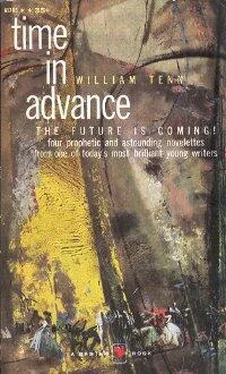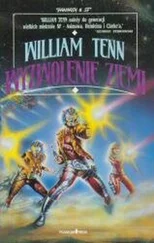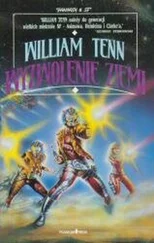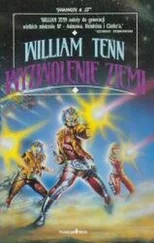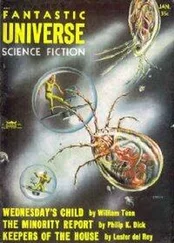William Tenn - Winthrop Was Stubborn
Здесь есть возможность читать онлайн «William Tenn - Winthrop Was Stubborn» весь текст электронной книги совершенно бесплатно (целиком полную версию без сокращений). В некоторых случаях можно слушать аудио, скачать через торрент в формате fb2 и присутствует краткое содержание. Год выпуска: 1957, Издательство: Galaxy Publishing Corporation, Жанр: Фантастика и фэнтези, на английском языке. Описание произведения, (предисловие) а так же отзывы посетителей доступны на портале библиотеки ЛибКат.
- Название:Winthrop Was Stubborn
- Автор:
- Издательство:Galaxy Publishing Corporation
- Жанр:
- Год:1957
- ISBN:нет данных
- Рейтинг книги:5 / 5. Голосов: 1
-
Избранное:Добавить в избранное
- Отзывы:
-
Ваша оценка:
- 100
- 1
- 2
- 3
- 4
- 5
Winthrop Was Stubborn: краткое содержание, описание и аннотация
Предлагаем к чтению аннотацию, описание, краткое содержание или предисловие (зависит от того, что написал сам автор книги «Winthrop Was Stubborn»). Если вы не нашли необходимую информацию о книге — напишите в комментариях, мы постараемся отыскать её.
magazine in 1957.
Winthrop Was Stubborn — читать онлайн бесплатно полную книгу (весь текст) целиком
Ниже представлен текст книги, разбитый по страницам. Система сохранения места последней прочитанной страницы, позволяет с удобством читать онлайн бесплатно книгу «Winthrop Was Stubborn», без необходимости каждый раз заново искать на чём Вы остановились. Поставьте закладку, и сможете в любой момент перейти на страницу, на которой закончили чтение.
Интервал:
Закладка:
They had explained to him painfully, elaborately, that they could not be such superb intellects, so thoroughly rational, unless they periodically released themselves in this fashion. It made sense, but—still—watching them do it was absolutely horrifying. He knew he would never be able to stand the sight of it.
Still, this one could make acceptable in some corner of the brain. But the chess business?
Since his college days, Dave Pollock had fancied himself as a chess player. He was just good enough to be able to tell himself that if ever he had the time to really concentrate on the game, to learn the openings, say, as they should be learned, he’d be good enough to play in tournaments. He’d even subscribed to a chess magazine and followed all the championship matches with great attention. He’d wondered what chess would be like in the future—surely the royal game having survived for so many centuries would survive another five? What would it be like: a version of three-dimensional chess, or possibly another, even more complex evolution?
The worst of it was the game was almost identical with the one played in the twentieth century.
Almost every human being in 2458 played it; almost every human being in 2458 enjoyed it. But there were no human champions. There were no human opponents.
There were only the chess machines. And they could beat anybody.
“What’s the sense,” he had wailed, “of playing with a machine which has millions of `best moves and countermoves’ built into its memory circuits? That has a selector mechanism able to examine and choose from every chess game ever recorded? A machine which has been designed never to be beaten? What’s the sense—where’s the excitement?
“We don’t play to win,” they had explained wonderingly. “We play to play. It’s the same with all our games: aggressions are gotten rid of in a Shriek or a Panic, games are just for mental or physical exercise. And so, when we play, we want to play against the best. Besides, every once in a while, an outstandingly good player, once or twice in his lifetime, is able to hold the machine to a draw. Now, that is an achievement. That merits excitement.”
You had to love chess as much as he did, Dave Pollock supposed, to realize what an obscenity the existence of these machines made of it. Even the other three in his group, who had become much more restive than he at twenty-fifth century mechanisms and mores, only stared at him blankly when he raged over it. No, if you didn’t love something, you weren’t bothered overmuch when it was degraded. But surely they could see the abdication of human intellect, of human reason, that the chess machines implied?
Of course, that was nothing compared to the way human reason had abdicated before the Oracle Machine. That was the last, disgusting straw to a rational person.
The Oracle Machine. He glanced at his watch. Only twenty-five minutes left. Better hurry. He took one last self-encouraging breath and climbed the cooperative steps of the building.
“My name is Stilia,” a bald-headed, rather pleasant-faced young woman said as she came toward him in the spacious anteroom. “I’m the attendant of the machine for today. Can I help you?”
“I suppose so.” He looked uncomfortably at a distant, throbbing wall. Behind the yellow square on that well, he knew, was the inner brain of the Oracle Machine. How he’d love to kick a hole in that brain.
Instead, he sat down on an upraised hummock of floor and wiped his perspiring hands carefully. He told her about their approaching deadline, about Winthrop’s stubbornness, about the decision to consult the Oracle Machine.
“Oh, Winthrop, yes! He’s that delightful old man. I met him at a dream dispensary a week ago. What wonderful awareness he has! Such a total immersion in our culture! We’re very proud of Winthrop. We’d like to help him every way we possibly can.”
“If you don’t mind, lady,” Dave Pollock said morosely, “we’re the ones who need help. We’ve got to get back.”
Stilia laughed. “Of course. We’d like to help everybody. Only Winthrop is— special. He’s trying hardest. Now, if you’ll just wait here, I’ll go in and put your problem before the Oracle Machine. I know how to do it so that it will activate the relevant memory circuits with the least loss of time.”
She flexed her right arm at him and walked toward the yellow square. Pollock watched it expand in front of her, then, as she went through the opening it made, contract behind her. In a few minutes she returned.
“I’ll tell you when to go in, Mr. Pollock. The machine is working on your problem. The answer you get will be the very best that can be made, given the facts available.”
“Thanks.” He thought for a while. “Tell me something. Doesn’t it seem to take something out of life—out of your thinking life—to know that you can take absolutely any problem, personal problem, scientific problem or working problem, to the Oracle Machine and it will solve it much better than you could?”
Stilia looked puzzled. “Not at all. To begin with, problem-solving is a very small part of today’s thinking life. It would be as logical to say that it took something vital out of life to make a hole with an electric drill instead of a hand drill. In your time, no doubt, there are people who feel just that way, they have the obvious privilege of not using electric drills. Those who use electric drills, however, have their physical energy freed for tasks they regard as more important. The Oracle Machine is the major tool of our culture; it has been designed toward just one end—computing all the factors of a given problem and relating them to the totality of pertinent data that is in the possession of the human race. But even if people consult the Oracle Machine, they may not be able to understand and apply the answer. And, if they do understand it, they may not choose to act on it.”
“They may not choose to act on it? Does that make sense? You said yourself the answers are the very best that can be made, given the facts available.”
“Human activities don’t necessarily have to make sense. That is the prevailing and rather comfortable modern view, Mr. Pollock. There is always the individual eccentric impulse.”
“Yeah, there’s always that,” he growled. “Resign your private, distinct personality by running with a howling mob at Shriek Field, lose all of yourself in an insane crowd—but don’t forget your individual eccentric impulse. Never, never forget your individual eccentric impulse!”
She nodded soberly. “That really sums it up, I must say, in spite of your rather unmistakable sarcasm. Why do you find it so hard to accept? Man is both a herd animal and a highly individualistic animal—what we call a self-realizable animal. The herd instincts must be satisfied at whatever cost, and have been in the past through such mechanisms as warfare, religion, nationalism, partyism and various forms of group chauvinism. The need to resign one’s personality and immerse in something larger than self has been recognized since earliest times: Shriek Fields and Panic Stadiums everywhere on the planet provide for this need and expend it harmlessly.”
“I wouldn’t say it was so harmless from the look of that mechanical rabbit, or whatever it was.”
“I understand that human beings who took the place of the mechanical rabbit in the past looked much worse when a herd of men was through with them,” she suggested, locking eyes with him. “Yes, Mr. Pollock, I think you know what I mean. The self-realizable instincts, on the other hand, must be satisfied, too. Usually, they can be satisfied in terms of one’s daily life and work, as the herd instincts can be fulfilled by normal group relationships and identification with humanity. But occasionally, the self-realizable instincts must be expressed at abnormal strengths, and then we have to have a kind of private Shriek Field—the concept of individual eccentric impulse. The two are opposite poles of exactly the same thing. All we require is that another human being will not be actively interfered with.”
Читать дальшеИнтервал:
Закладка:
Похожие книги на «Winthrop Was Stubborn»
Представляем Вашему вниманию похожие книги на «Winthrop Was Stubborn» списком для выбора. Мы отобрали схожую по названию и смыслу литературу в надежде предоставить читателям больше вариантов отыскать новые, интересные, ещё непрочитанные произведения.
Обсуждение, отзывы о книге «Winthrop Was Stubborn» и просто собственные мнения читателей. Оставьте ваши комментарии, напишите, что Вы думаете о произведении, его смысле или главных героях. Укажите что конкретно понравилось, а что нет, и почему Вы так считаете.
